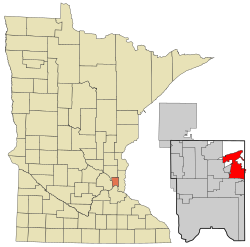White Bear Lake, Minnesota
| White Bear Lake | |
|---|---|
| City | |
| White Bear Lake, Minnesota | |
| Nickname(s): Beartown, The Burr | |
| Motto: City of Lakes and Legends | |
 Location of the city of White Bear Lake within Ramsey and Washington Counties in the state of Minnesota |
|
| Coordinates: 45°4′11″N 93°0′40″W / 45.06972°N 93.01111°W | |
| Country | United States |
| State | Minnesota |
| Counties | Ramsey, Washington |
| Area | |
| • Total | 8.66 sq mi (22.43 km2) |
| • Land | 8.02 sq mi (20.77 km2) |
| • Water | 0.64 sq mi (1.66 km2) |
| Elevation | 942 ft (287 m) |
| Population (2010) | |
| • Total | 23,797 |
| • Estimate (2015) | 25,205 |
| • Density | 2,967.2/sq mi (1,145.6/km2) |
| Time zone | Central (CST) (UTC-6) |
| • Summer (DST) | CDT (UTC-5) |
| ZIP code | 55110 |
| Area code(s) | 651 |
| FIPS code | 27-69970 |
| GNIS feature ID | 0654077 |
| Website | City of White Bear Lake |
White Bear Lake is a city in Ramsey County in the state of Minnesota. A small portion of the city also extends into Washington County. The population was 23,769 at the 2010 census. The city is located on White Bear Lake, one of the largest lakes in the Minneapolis-St. Paul metropolitan area.
The city is named after its largest lake, White Bear Lake. American writers have delivered differing versions of the legend that explains the origin of the name. In her book Indian Legends of Minnesota, Mrs. Carl T. Thayer writes that "It is said that a Sioux maiden fell in love with a Chippewa brave. She, the daughter of the Chief, on learning that her father planned war against the Chippewa, ran to her lover and warned him. The brave went alone into the Sioux village to ask for peace and the hand of the maiden. Before the Chief would agree, the Chippewa would have to do a brave deed."
"The lovers usually met on Manitou Island. One day, as the brave approached the Island, anticipating a meeting with his beloved, he saw, to his horror, a great white bear attacking her. He dashed to her rescue. Freed, she ran to get help from her father and the other Sioux. Returning, they saw the brave sink his knife into the bear. But too late, they both fell to the ground dead. Slowly, as they watched, the spirits of the brave and the bear rose from their prone bodies. It is said that even today, as night falls, the spirits of the bear and the brave wander the Island eternally in search of each other."
In Mark Twain's memoir Life on the Mississippi, he offers a different ending, relaying that "… the warrior, with one plunge of the blade of his knife, opened the crimson sluices of death, and the dying bear relaxed his hold. "That night, there was no more sleep for the band or the lovers, and as the young and the old danced about the carcass of the dead monster, the gallant warrior was presented with another plume, and ere another moon had set he had a living treasure added to his heart. Their children for many years played upon the skin of the white bear – from which the lake derives its name, and the maiden and the brave remembered long the fearful scene and rescue that made them one, for Kis-se-me-pa and Ka-go-ga could never forget their fearful encounter with the huge monster that came so near sending them to the happy hunting ground."
...
Wikipedia
